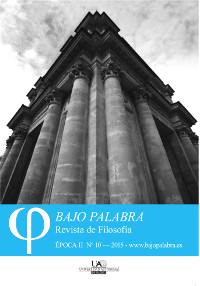Ciencia e imaginación en la apreciación estética de la naturaleza. Una aproximación a la obra de Tim Birkhead y John Baker
Palabras clave:
Estética de la naturaleza, cognitivismo científico, imaginación estética, Tim Birkhead, John BakerDerechos de autor 2015 Fernando Arribas Herguedas

Esta obra está bajo una licencia internacional Creative Commons Atribución 4.0.
Resumen
Este artículo esboza una perspectiva moderadamente pluralista de la apreciación estética de la naturaleza que armoniza la tesis central del modelo cognitivista científico de Allen Carlson con los enfoques que otorgan un papel crucial a la imaginación, como los desarrollados por Ronald Hepburn y Emily Brady. Para ello, se recurre a la lectura paralela de dos obras que no son estrictamente filosóficas: Bird Sense, del biólogo Tim Birkhead, y The Peregrine de John A. Baker. Ambas obras comparten el intento de contemplar el mundo desde una conciencia diferente, lo que exige el concurso simultáneo del método científico y del esfuerzo imaginativo propio del discurso filosófico y la sensibilidad estética.
Descargas
Citas
Baker, John (2011), The Peregrine, The Hill of Summer and Diaries: The Complete Works of J. A. Baker, Londres, Collins.
Berleant, Arnold (1992), The Aesthetics of Environment, Philadelphia, Temple University Press.
Birkhead, Tim (2012), Bird Sense. What It’s Like to Be a Bird, Londres, Bloomsbury.
Brady, Emily (1998), “Imagination and the Aesthetic Appreciation of Nature”, The Journal of Aesthetics and Art Criticism 56, 2, pp. 139-147.
Brady, Emily (2003), Aesthetics of the Natural Environment, Tuscaloosa, University of Alabama Press.
Carlson, Allen (2000), Aesthetics and the Environment: The Appreciation of Nature, Art and Architecture, Nueva York / Londres, Routledge.
Foster, Cheryl (1998), “The Narrative and the Ambient in Environmental Aesthetics”, Journal of Aesthetics and Art Criticism 56, 2, pp. 127–137.
Fudge, Robert (2001), “Imagination and the Science-Based Aesthetic Appreciation of Unscenic Nature”, The Journal of Aesthetics and Art Criticism 59, 3, pp. 275-285.
Gray, John (2013), El silencio de los animales. Sobre el progreso y otros mitos modernos, Madrid, Sexto Piso.
Hepburn, Ronald (1996), “Landscape and the Metaphysical Imagination”, Environmental Values 5, pp. 191-204.
Hepburn, Ronald (2001), “Trivial and Serious in Aesthetic Appreciation of Nature”, en Ronald Hepburn, The Reach of the Aesthetic: Collected Essays on Art and Nature, Aldershot, Ashgate, pp. 1-15.
Nagel, Thomas (1974), “What Is It Like to Be a Bat?”, The Philosophical Review, 83, 4, pp. 435-450
Oelschlaeger, Max (1991), The Idea of Wilderness. From Prehistory to the Age of Ecology, New Haven, Yale University Press.
Parsons, Glenn (2008), Aesthetics and Nature, Londres, Continuum.
Saito, Yuriko (1998), “The Aesthetics of Unscenic Nature”, Journal of Aesthetics and Art Criticism, 56, 2, pp. 101-111.
